Wed 7 Jul 2021
A Book! Movie!! Review by Daid Vineyard: CHRISTOPHER LANDON – Ice Cold in Alex // Film (1958).
Posted by Steve under Action Adventure movies , Reviews[8] Comments
CHRISTOPHER LANDON – Ice Cold in Alex. Heinemann, UK, hardcover, 1957. Sloane, US, hardcover, 1957. Also published as Hot Sands of Hell (Zenith ZB-43, US, paperback, 1960).

ICE COLD IN ALEX. ABPC, UK, 1958; released in the US as Desert Attack. John Mills, Sylvia Sims, Anthony Quayle, Harry Andrews, Diane Clare, Richard Leach, Liam Redmond, Walter Gotell. Screenplay: T. J. Morrison, based on the novel by Christopher Landon. Directed by J. Lee Thompson.
“It†is beer, they serve it ice cold in Alexandria, Egypt at the canteen, and for Captain George Anson who is stationed in Tobruk on the eve of its fall to the advancing forces of General Erwin Rommel, beer has become a beacon of hope amid the routine and routine fear of the pounding being taken as Rommel advances and there is less and less chance of survival…
He knew that the fear had come to stay now — not coming and then draining away, as it had for the last two days.
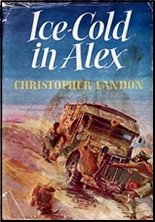
Anson has been drinking more heavily with the fear and now the fear is constant as is the dream of that ice cold drink in Alex. That’s why it seems like a dream when his commander sends him, and Sgt-Major Tom Pugh on a special assignment to escort two nurses across the desert avoiding the Germans to the relative safety of Alexandria.
The two nurses are Sister Diana and Sister Denise, the latter who has nearly lost her nerve under the German bombardment. Anson has missed the convoy, but it they leave now they can rendezvous with another for escort. At least that is the plan.
Like many classics the set-up is a simple one. It’s the complications that follow that make the tale. Complications about the German patrol that lets them go if they will take on the South African civilian Zimmerman with them, like the impossible terrain they are forced to take to avoid more Germans, like mine fields, breakdowns, missed rendezvous, unexpected romance, salt marshes, death, thirst, fear, pain, and just maybe a German spy in their midst and perhaps that he might be their only hope to survive…
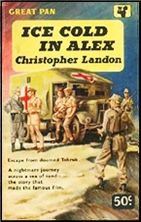
Christopher Landon is better known in the UK than here, and mostly for this book, though he wrote several other well-received thrillers. Perhaps it was just his fate to come along during the Golden Age of the British thriller at the same time as Hammond Innes, Victor Canning, Alistair MacLean, Gavin Lyall, Desmond Bagley, and Elleston Trevor (whom Landon most closely resembles). Somehow Landon slipped a little between the cracks, at least with American audiences.
It could be some of his books are a bit bleaker than the other writers on that list , that he wanders into Graham Greene country of moral ambiguity and redemption rather than high adventure, or maybe he was just too grounded to compete with the higher flying competition.
Whatever the reason this book was a masterpiece, and it was snapped up for a film.
Some films are better than the book.
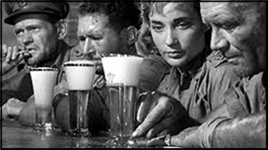
This one took a fine book and turned it into a legendary war film, one of the best of its era, one of the best of any era.
John Mills, the everyman (at least every Englishman) of his acting generation, was Anson. Sylvia Sims was Diana Norton, Harry Andrews (who else) Mechanist Sgt-Major Pugh, and Anthony Quayle, the mysterious man who joins them on their adventure across the Sahara.
J. Lee Thompson of Cape Fear and The Guns of Navarone directed with the same set of skills demonstrated in those other films.
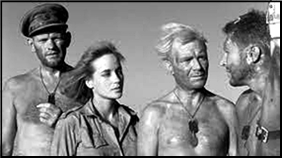
The plot, most of the incidents from the book are the same are but boiled down to a little over two hours, bleakly photographed in black and white, nerve-wracking foot by foot of the journey, their fear, thirst, and distrust writ tautly across the screen, and the nerves ratcheted up right down to the final minutes and the satisfying humanity reaffirming anti climax.
Like Flight of the Phoenix, another adventure film about unlikely survival in the desert this one holds you right down to the end.
Ice Cold In Alex is an anti-war film, it is about humanity among a small group of diverse people in danger. Films like Lost Patrol, Sahara, and Bridge on the River Kwai come to mind. This one stands beside them.
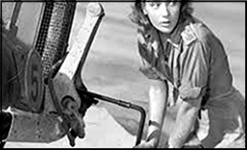
Mills, Quayle, and Andrews steal the show, and Andrews very nearly steals it from the other two. Acting styles may be a bit different than today, some might find there are too many speeches designed to explain things, the considerable acting skills a bit more on the nose than modern audiences are used to.
That really doesn’t matter much. This is a superb film, a classic, one of the best war films from an era when some of the finest war films ever made were being turned out. It features three of the finest actors the British film industry had to offer, and it still has something to say about men in war and where survival outweighs politics.
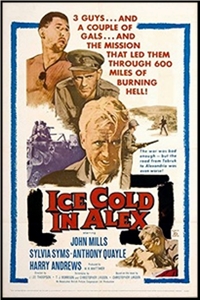
July 8th, 2021 at 1:28 am
I haven’t read the source material but yes indeed, a crackling, smart, corking good film. A man’s movie.
I’ve had obsessions about beers like Mills’ Capt. Anson suffers. There’s a particular brand which was Hemingway’s favorite, which they stopped making, used to be my go-to on hot days. Still pine for it.
Antony Quayle is startling in this role as a ‘rum character’. The big man could be menacing with his size, something rarely seen in more cheerier assignments.
Didn’t realize Walter Gotell was a player in this. Learned something new.
July 8th, 2021 at 3:19 am
Christopher Landon died of alcohol & barbiturate poisoning age 50 in 1961. This might be one of the reasons he is almost completely forgotten as an author. I had a proof copy in dust-jacket of the first UK which I wish I hadn’t sold. The only book of his I have read is The Shadow of Time which was very good though it could have been a little longer! More about the author can be found on Steve Holland’s blogpost: https://bearalley.blogspot.com/2010/09/christopher-landon.html
July 8th, 2021 at 9:25 am
Thanks for the link, Jamie. Steve H does his usual superb write-up on Landon, and it’s easily worth the time for everyone reading this to go read for themselves.
I had already learned that Landon was only 50 when he died, but I didn’t know the circumstances. I agree with everyone that that’s the most obvious reason as to why he’s so little remembered today.
July 8th, 2021 at 7:06 am
Haven’t seen the movie, and I think i haven’t read the book though the title sounds naggingly familiar.
Following the usual Internet rabbit holes I ended up here, reading an exchange of letters between Martin Scorsese, Edgar Wright (Shaun of the Dead, Hot Fuzz) and Quentin Tarantino listing their favorite lesser known British movies. I have a strong feeling readers of this blog will love most of them.
And “Ice cold in Alex” has entered my viewing queue.
July 8th, 2021 at 9:30 am
After reading David’s review of both the book and movie, I’m also a lot more likely to watch the movie than read the book, as good as it may be. I have to admit that it’s a movie I’d never even heard of before, and it’s now in my own personal queue as well.
And thanks too for the link containing all of those other British movies worth seeing. Another confession. Most of them are still on my “to be seen” list. Most of them came out long before home viewing was possible, unless picked up by chance by one of the three existing TV networks, and when getting out to the movies was usually a once a week affair.
July 8th, 2021 at 4:57 pm
In addition to being a fine actress, Sylvia Syms was a great beauty, and she’s still kicking at age 87.
July 8th, 2021 at 8:36 pm
Good to know, and I most wholeheartedly agree!
July 10th, 2021 at 9:06 am
Streaming for free on Hoopla!